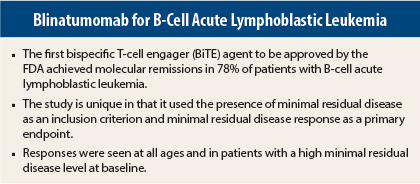Long in the works, early results of the U.S. Intergroup C10403 trial clearly showed that treating acute lymphoblastic leukemia (ALL) in adolescents and young adults using a pediatric-inspired regimen improves event-free survival and overall survival and should be the backbone for future studies in this age group.1 Experts agreed that this finding represents a paradigm shift in how to treat adolescents and young adults with ALL.
“This large North American trial validates that pediatric ALL regimens administered by adult hematologists/oncologists improve survival in adolescents and young adults compared with adult regimens. The 2-year event-free survival of 66% and 2-year overall survival of 79% are major improvements compared with 34% and 39%, respectively, in historic controls. This is a clear opportunity to improve care in adolescents and young adults with ALL,” said lead author Wendy Stock, MD, of the University of Chicago Medical Center.
Other important findings of this long-awaited study are that the presence of a BCR-ABL1–like signature and aberrant CRLF2 expression are associated with worse event-free survival and overall survival and represent high-risk characteristics.
“Excellent event-free survival and overall survival were achieved if these features were not present,” Dr. Stock told the audience. “We can now focus additional research on evaluating novel treatment combinations to reduce minimal residual disease in these patients to further improve their duration of response and long-term survival.”
The concept that pediatric regimens could improve outcomes for adolescents and young adults with ALL gained attention in the year 2000, when retrospective data showed that outcomes were dramatically different, “depending on the door through which these patients entered,” she said. At that time, Dr. Stock and colleagues reported that patients aged 16 to 20 years had significantly better outcomes on pediatric protocols than on adult protocols, and this finding was subsequently confirmed by groups of investigators in multiple countries.
The cooperative groups undertook the Intergroup C10403 trial in North America to evaluate treatment with a pediatric-intensive regimen by adult hematologists/oncologists. At the 2014 ASH Annual Meeting, Dr. Stock presented the main results of the trial. Findings on adherence and outcomes based on psychosocial factors will be presented separately in the future.
A Glimpse at Study Details
The study enrolled 318 patients, aged 16 to 39 years old, with ALL; 22 patients withdrew from the study, many of whom had Philadelphia chromosome–positive disease, which was an exclusion criterion. From 2007 to 2013, 296 patients were treated.
The median age of study patients was 25 years, and most patients were between 20 and 29 years. Seventy-five percent were white, 10% were African American, and 15% were Hispanic/Latino. About three-quarters had B-precursor ALL and one-quarter, T-precursor ALL. Interestingly, 31% had a body mass index > 30, and 7% were morbidly obese.
The backbone of the pediatric-inspired regimen included intensified glucocorticoid, vincristine, and pegylated L-asparaginase (Oncaspar) and more maintenance therapy. “These are the essential ingredients. The drugs we intensified in the adult ALL world were myelosuppressive. This regimen goes back to nonmyelosuppressive regimens,” Dr. Stock explained at a press conference. The regimen consisted of induction, consolidation, interim maintenance, delayed intensification, and prolonged maintenance (2 years for girls and 3 years for boys).
Foundation for Future Studies
Event-free survival analysis showed no difference according to age group or precursor B-cell or T-cell lineage. Overall survival was significantly worse in obese patients and significantly improved in patients with undetectable minimal residual disease, Dr. Stock said.
In a multivariate analysis, the only significant risk factor for event-free survival and overall survival was aberrant expression of CRLF2. Dr. Stock noted that only 90 patients had sufficient data for inclusion in the multivariate analysis.
The regimen still needs to be fine-tuned to optimize dose reductions in pegylated-L-asparaginase and still achieve adequate depletion of leukemic cells, she told the audience.
“Use of the pediatric regimen in C10403 will serve as a foundation for future studies in adolescents and young adults with ALL in U.S. Intergroup trials. This represents a shift in the approach to treatment of adolescents and young adults with ALL,” Dr. Stock stated.
Dr. Stock and colleagues are preparing a concept for the successor U.S. Intergroup trial, which should begin in 2015. The plans include use of the molecular signature of the disease to stratify patients and to add either a novel antibody or a targeted kinase inhibitor to eradicate minimal residual disease and improve outcomes.
“Other groups around the world are also adopting the use of pediatric regimens for the treatment of the young adult with ALL,” Dr. Stock said in an e-mail. ■
Disclosure: Dr. Stock has received research funding from Sigma-Tau and is a member of an entity’s Board of Directors or advisory committees.
Reference
1. Stock W, Luger SM, Advani AS, et al: Favorable outcomes for older adolescents and young adults (AYA) with acute lymphoblastic leukemia (ALL): Early results of U.S. Intergroup Trial C10403. 2014 ASH Annual Meeting. Abstract 796. Presented December 9, 2014.



